Beca Lewis's Blog: Beca's Blog, page 20
July 20, 2015
Why We Have To Choose The Problems We Have - The Shift
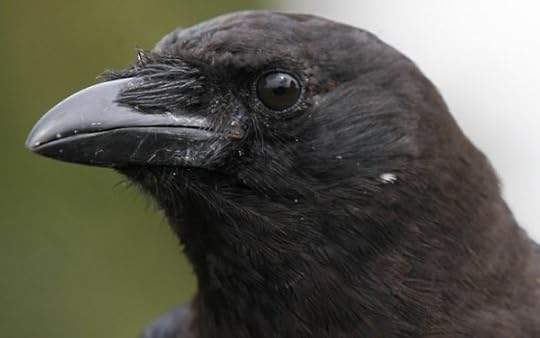
[image error]This is a story about crows and choice. Our crows. That’s the key to the story, we had to accept that they were our crows.
We feed birds, lots of birds, and that included allowing the crows to eat the suet I hang out for what I considered prettier birds.
For a few years we had a nice couple who came to our feeder. I thought it was lovely that they lived in our meadow. I enjoyed them. It was kinda cute. I liked to pretend that they were my friends and they liked me.
But, one year I got ticked off at them. It seemed as if they had brought their friends and they were noisy, big, and took huge bites. It seemed wrong somehow when my daintier birds, IE smaller birds, didn’t eat quite so much and were not so noisy.
It was too much, so I started chasing them away when they showed up to eat.
Nothing happened that year.
The next year I continued to shoo the crows away from the feeder.
As usual, we planted our garden. I used a seed pod to start the corn in a miniature greenhouse. Once they were seedlings we planted them. It was a lot of work. One morning as we drove off to teach a class, we looked at our garden and admired how good the corn looked.
It was different when we returned a few hours later. We were shocked. All the corn had been yanked out of the ground.
We replanted with seed directly into the ground and it happened again – and again. Three times that summer the crows pulled out all the corn.
We did everything we could to stop them. It was only after we netted the garden that we finally got the corn to grow. And that’s what we did the next year. With a netted garden all was well, except for the extra work required.
Then one day I read about how smart and giving crows are to people they like. I told Del what I had read, and of course he understood right away. That spring Del said, “No more netting the garden, go back to feeding the crows.”
I did.
After that, the only time I saw them in the garden was the day I forgot to put suet out. They weren’t doing anything, just walking through the garden, and looking back at me. I knew what they were saying, “Come on, just a little food and we are your friends.
And they are. This summer they had four children, and I could tell them all apart some of the time, mostly by how they got to the suet. One jumped. One stood on a handle and reached over. One had little white marks on its wings.
For about a week it sounded as if we lived in a babies’ nursery. The babies, although as big as their parents, were loud and demanding and it was funny to watch their parents try to get some time to themselves. One afternoon, I watched as all four babies lined up on the side of the bird bath as the parent crows nudged them to take a bath one at a time.
Here’s the whole point of this story. We had to choose the crows. When we didn’t, live was messy. When we did, the mess went away, and joy took over.
How many things in our life do we pretend are not really present. Or someone else is responsible for the problem.
Until then, the problems are in charge.
The crows taught me a lesson. That is what crows do. Actually, that is what all of nature does, shows us what we need to learn. We just have to pay attention.
From the crows the message is, “Choose what you have, take care of it, and it will take care of you.”
PS
Love this idea of crows as symbol? Download Del’s paper on crows.
The post Why We Have To Choose The Problems We Have by Beca Lewis appeared first on The Shift.
Why We Have To Choose The Problems We Have - The Shift To Spiritual Perception

 This is a story about crows and choice. Our crows. That’s the key to the story, we had to accept that they were our crows.
This is a story about crows and choice. Our crows. That’s the key to the story, we had to accept that they were our crows.
We feed birds, lots of birds, and that included allowing the crows to eat the suet I hang out for what I considered prettier birds.
For a few years we had a nice couple who came to our feeder. I thought it was lovely that they lived in our meadow. I enjoyed them. It was kinda cute. I liked to pretend that they were my friends and they liked me.
But, one year I got ticked off at them. It seemed as if they had brought their friends and they were noisy, big, and took huge bites. It seemed wrong somehow when my daintier birds, IE smaller birds, didn’t eat quite so much and were not so noisy.
It was too much, so I started chasing them away when they showed up to eat.
Nothing happened that year.
The next year I continued to shoo the crows away from the feeder.
As usual, we planted our garden. I used a seed pod to start the corn in a miniature greenhouse. Once they were seedlings we planted them. It was a lot of work. One morning as we drove off to teach a class, we looked at our garden and admired how good the corn looked.
It was different when we returned a few hours later. We were shocked. All the corn had been yanked out of the ground.
We replanted with seed directly into the ground and it happened again – and again. Three times that summer the crows pulled out all the corn.
We did everything we could to stop them. It was only after we netted the garden that we finally got the corn to grow. And that’s what we did the next year. With a netted garden all was well, except for the extra work required.
Then one day I read about how smart and giving crows are to people they like. I told Del what I had read, and of course he understood right away. That spring Del said, “No more netting the garden, go back to feeding the crows.”
I did.
After that, the only time I saw them in the garden was the day I forgot to put suet out. They weren’t doing anything, just walking through the garden, and looking back at me. I knew what they were saying, “Come on, just a little food and we are your friends.
And they are. This summer they had four children, and I could tell them all apart some of the time, mostly by how they got to the suet. One jumped. One stood on a handle and reached over. One had little white marks on its wings.
For about a week it sounded as if we lived in a babies’ nursery. The babies, although as big as their parents, were loud and demanding and it was funny to watch their parents try to get some time to themselves. One afternoon, I watched as all four babies lined up on the side of the bird bath as the parent crows nudged them to take a bath one at a time.
Here’s the whole point of this story. We had to choose the crows. When we didn’t, live was messy. When we did, the mess went away, and joy took over.
How many things in our life do we pretend are not really present. Or someone else is responsible for the problem. Instead, when we choose the issue, and make it our own, we can do something about it.Tweet This
Until then, the problems are in charge.
The crows taught me a lesson. That is what crows do. Actually, that is what all of nature does, shows us what we need to learn. We just have to pay attention.
From the crows the message is, “Choose what you have, take care of it, and it will take care of you.”
PS
Love this idea of crows as symbol? Download Del’s paper on crows.
The post Why We Have To Choose The Problems We Have by Beca Lewis appeared first on The Shift To Spiritual Perception.
July 6, 2015
Do You Love Boldly? - The Shift
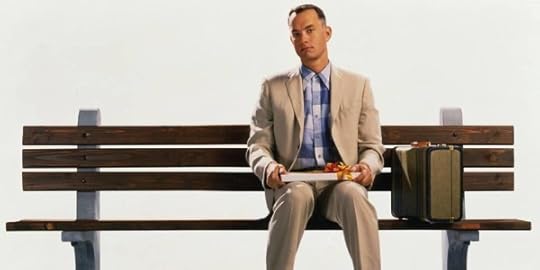
 “You don’t know what love is.” That’s what Jenny said to Forest in the movie “Forest Gump.” At the end of the movie when he told her, “I do know what love is Jenny,” we all knew that he did.
“You don’t know what love is.” That’s what Jenny said to Forest in the movie “Forest Gump.” At the end of the movie when he told her, “I do know what love is Jenny,” we all knew that he did.
“Love always shows up.” That’s what someone said to me years ago when I was questioning another’s love for me. That person didn’t show up for me and so I had my answer.
But, Forest did for Jenny. He consistently loved without the question “what’s in it for me.” Instead, he boldly loved, without guilt or need, because he knew himself and was clear about his intent and purpose.
I once gave a sermon called “Disguising Ourselves As Human.” But, we disguise ourselves in many more ways than just as a human. We disguise ourselves as our jobs, our past, our family, our race, and our sex. The list is endless, and every one of these disguises keeps us from completely showing up for those we love. When we show up for other people as part of our disguise it is often not love, it is escape.
Life gives us moments that we can seize to learn more about boldly loving instead of escaping to “good deeds.” Once, after twisting my ankle, I had to shuffle along and even sit down all day and let Del take care of me.
It was hard for me to do. I am used to getting up, doing things, keeping busy, helping out, seeing what others need, and in general escaping in my disguise as efficient and caring. Letting Del take care of me revealed my disguise to myself—I am sure he already knew. Now, I know a little bit more about how to show up for myself and others without all the disguises.
When I was in my early twenties I read a quote by Dag Hammarskjold, the Secretary General of the United Nations, that I have never forgotten, but often forget to apply.
Mr. Hammarskjold was awarded the Noble Peace Prize posthumously in 1961. I tell you this so there can be no misunderstanding about his meaning. He said, “It is more noble to give yourself completely to one individual than to labor diligently for the salvation of the masses”.
We make love complicated. We escape from this kind of bold love through our disguises and in our “duties” to mankind and others.
We mistake big events as something important and miss out on the small events that mean so much more. Loving boldly is about loving consistently in everyday life.
Mr. Hammarskjold also said, “The ‘great commitment’ is so much easier than the ordinary, everyday one—and we can all too easily shut our hearts to the latter. A willingness to make the ultimate sacrifice can be associated with, and even produce, a great hardness of heart.”
It is oh so easy to hide in the excitement of a big plan. It is oh so dangerous to forget that real love is simple, powerful, effective, and consistent. Love is a bold choice. Love always shows up.
Look into your life. Is it what you meant it to be? Do you know who loves you? Do you love boldly and consistently in the little things? Are you making choices based on success measured by money, fame, or guilt instead of love?
When we face situations, both large and small, it is a focus on the boldness of love that will heal any situation.
Boldness that stems from the principle of Love does not begin in fear. It flows from an unshakable awareness of its ultimate power over all that does not appear as love. If we are not afraid for ourselves, we are not afraid for others.
Showing up as Love is what we will do because it is a part of our being. Focusing on what is true Love, we can clearly see what is not. We will demand that it be corrected within ourselves first. As a result, we will not accept anything less than true bold love from others.
We will stop making decisions that are based on fear, greed, or personal need.
Forest may have said, “Life is like a box of chocolates” but his love held no surprises. He lived boldly and consistently and acting from love, he always showed up.
The post Do You Love Boldly? by Beca Lewis appeared first on The Shift.
Do You Love Boldly? - The Shift To Spiritual Perception
 “You don’t know what love is.” That’s what Jenny said to Forest in the movie “Forest Gump.” At the end of the movie when he told her, “I do know what love is Jenny,” we all knew that he did.
“You don’t know what love is.” That’s what Jenny said to Forest in the movie “Forest Gump.” At the end of the movie when he told her, “I do know what love is Jenny,” we all knew that he did.
“Love always shows up.” That’s what someone said to me years ago when I was questioning another’s love for me. That person didn’t show up for me and so I had my answer.
But, Forest did for Jenny. He consistently loved without the question “what’s in it for me.” Instead, he boldly loved, without guilt or need, because he knew himself and was clear about his intent and purpose.
I once gave a sermon called “Disguising Ourselves As Human.” But, we disguise ourselves in many more ways than just as a human. We disguise ourselves as our jobs, our past, our family, our race, and our sex. The list is endless, and every one of these disguises keeps us from completely showing up for those we love. When we show up for other people as part of our disguise it is often not love, it is escape.
Life gives us moments that we can seize to learn more about boldly loving instead of escaping to “good deeds.” Once, after twisting my ankle, I had to shuffle along and even sit down all day and let Del take care of me.
It was hard for me to do. I am used to getting up, doing things, keeping busy, helping out, seeing what others need, and in general escaping in my disguise as efficient and caring. Letting Del take care of me revealed my disguise to myself—I am sure he already knew. Now, I know a little bit more about how to show up for myself and others without all the disguises.
When I was in my early twenties I read a quote by Dag Hammarskjold, the Secretary General of the United Nations, that I have never forgotten, but often forget to apply.
Mr. Hammarskjold was awarded the Noble Peace Prize posthumously in 1961. I tell you this so there can be no misunderstanding about his meaning. He said, “It is more noble to give yourself completely to one individual than to labor diligently for the salvation of the masses”.
We make love complicated. We escape from this kind of bold love through our disguises and in our “duties” to mankind and others.
We mistake big events as something important and miss out on the small events that mean so much more. Loving boldly is about loving consistently in everyday life.
Mr. Hammarskjold also said, “The ‘great commitment’ is so much easier than the ordinary, everyday one—and we can all too easily shut our hearts to the latter. A willingness to make the ultimate sacrifice can be associated with, and even produce, a great hardness of heart.”
It is oh so easy to hide in the excitement of a big plan. It is oh so dangerous to forget that real love is simple, powerful, effective, and consistent. Love is a bold choice. Love always shows up.
Look into your life. Is it what you meant it to be? Do you know who loves you? Do you love boldly and consistently in the little things? Are you making choices based on success measured by money, fame, or guilt instead of love?
When we face situations, both large and small, it is a focus on the boldness of love that will heal any situation.
Boldness that stems from the principle of Love does not begin in fear. It flows from an unshakable awareness of its ultimate power over all that does not appear as love. If we are not afraid for ourselves, we are not afraid for others.
Showing up as Love is what we will do because it is a part of our being. Focusing on what is true Love, we can clearly see what is not. We will demand that it be corrected within ourselves first. As a result, we will not accept anything less than true bold love from others.
We will stop making decisions that are based on fear, greed, or personal need.
Forest may have said, “Life is like a box of chocolates” but his love held no surprises. He lived boldly and consistently and acting from love, he always showed up.
The post Do You Love Boldly? by Beca Lewis appeared first on The Shift To Spiritual Perception.
June 22, 2015
Choosing To Perceive Differently - The Shift

[image error]
I was watching the chef Ina Garten make chocolate cupcakes with peanut butter frosting. As she spread the delicious looking frosting over the cupcakes she said, “These cupcakes are really a delivery system for the icing.”
We could take this different way of looking at a cupcake and use it to illustrate how what appears as a material universe is, in Reality, a spiritual one.
Grab your cupcake and icing and come along with me and I’ll show you what I mean.
Let’s start with Albert Einstein’s statement, “Space and time are not conditions in which we live; they are simply modes in which we think.”
If we begin with the idea that space and time are simply modes in which we think, then everything we see is actually a delivery system for the point of view that we have chosen in each moment.
For example, as I make breakfast, I could either chose to see it as a chore, or I could shift my perception and see this activity as a delivery system for love, creativity, order, respect, and substance.
As I pay bills, do my taxes, or balance my checkbook, I can either choose to see it as a scary event or a bothersome task. On the other hand, I could choose to see it as a delivery system for thankfulness, order, intelligence, awareness, stewardship, and care.
A grove of trees lives in our backyard. In the morning, we sit on the deck in the dark waiting for the sun to rise. We listen to the chorus of birds, and watch the rabbits, squirrels, and chipmunks as they begin their day. The trees sway and their leaves rustle in the wind as they provide homes, resting places, shade, and food.
I could appreciate these trees for all these reasons, or I could look with a different perception and appreciate them even more as a delivery system for the qualities of beauty, restfulness, creativity, uniqueness, trust, home, and grace.
The sun could be seen either as just light for the day or it could be seen as the delivery system for life, awareness, visibility, joy, and sparkle.
In fact, couldn’t the entire visible universe be the complete delivery system for the qualities of the One Intelligent Mind of Love?
It’s a choice of perception, and that choice completely determines our experience.
The worldview promotes a culture of lack and separation. It wants us to believe if we acquire what we need on the outside that will take care of the inside. For example, if we have the right home, companion, enough money, and health we will be happy.
It takes just a little bit of awareness, and observation, to see that this can’t be true. People with plenty of money aren’t necessarily happier than those who have less. People who might not feel well can be happier than those who are completely healthy.
The opposite perception and Spiritual point of view is, if we begin from within, the outside will take care of itself.
This is exactly what viewing the material world as a delivery system of our current highest understanding of the qualities of Spirit will do for us. It forces us to begin within. It teaches us how to see from a spiritual point of view.
As we practice translating what appears as things, into what they really are, the qualities of God, the outside world conforms to this awareness. This enables us to see that what appears as a material universe is in Reality, spiritual.
There are not two universes, just one.
As we get better at this awareness of what is already present, and stop living from the worldview of lack, what appears as our outside life must conform to our higher understanding of the qualities of the Infinite All.
Our lives just might be seen as a plate of cupcakes, a delivery system for Love.
The post Choosing To Perceive Differently by Beca Lewis appeared first on The Shift.
Choosing To Perceive Differently - The Shift To Spiritual Perception


I was watching the chef Ina Garten make chocolate cupcakes with peanut butter frosting. As she spread the delicious looking frosting over the cupcakes she said, “These cupcakes are really a delivery system for the icing.”
We could take this different way of looking at a cupcake and use it to illustrate how what appears as a material universe is, in Reality, a spiritual one.
Grab your cupcake and icing and come along with me and I’ll show you what I mean.
Let’s start with Albert Einstein’s statement, “Space and time are not conditions in which we live; they are simply modes in which we think.”
If we begin with the idea that space and time are simply modes in which we think, then everything we see is actually a delivery system for the point of view that we have chosen in each moment.
For example, as I make breakfast, I could either chose to see it as a chore, or I could shift my perception and see this activity as a delivery system for love, creativity, order, respect, and substance.
As I pay bills, do my taxes, or balance my checkbook, I can either choose to see it as a scary event or a bothersome task. On the other hand, I could choose to see it as a delivery system for thankfulness, order, intelligence, awareness, stewardship, and care.
A grove of trees lives in our backyard. In the morning, we sit on the deck in the dark waiting for the sun to rise. We listen to the chorus of birds, and watch the rabbits, squirrels, and chipmunks as they begin their day. The trees sway and their leaves rustle in the wind as they provide homes, resting places, shade, and food.
I could appreciate these trees for all these reasons, or I could look with a different perception and appreciate them even more as a delivery system for the qualities of beauty, restfulness, creativity, uniqueness, trust, home, and grace.
The sun could be seen either as just light for the day or it could be seen as the delivery system for life, awareness, visibility, joy, and sparkle.
In fact, couldn’t the entire visible universe be the complete delivery system for the qualities of the One Intelligent Mind of Love?
It’s a choice of perception, and that choice completely determines our experience.
The worldview promotes a culture of lack and separation. It wants us to believe if we acquire what we need on the outside that will take care of the inside. For example, if we have the right home, companion, enough money, and health we will be happy.
It takes just a little bit of awareness, and observation, to see that this can’t be true. People with plenty of money aren’t necessarily happier than those who have less. People who might not feel well can be happier than those who are completely healthy.
The opposite perception and Spiritual point of view is, if we begin from within, the outside will take care of itself.
This is exactly what viewing the material world as a delivery system of our current highest understanding of the qualities of Spirit will do for us. It forces us to begin within. It teaches us how to see from a spiritual point of view.
As we practice translating what appears as things, into what they really are, the qualities of God, the outside world conforms to this awareness. This enables us to see that what appears as a material universe is in Reality, spiritual.
There are not two universes, just one.
As we get better at this awareness of what is already present, and stop living from the worldview of lack, what appears as our outside life must conform to our higher understanding of the qualities of the Infinite All.
Our lives just might be seen as a plate of cupcakes, a delivery system for Love.
The post Choosing To Perceive Differently by Beca Lewis appeared first on The Shift To Spiritual Perception.
May 31, 2015
A Bee, A Hummingbird, and Freedom - The Shift
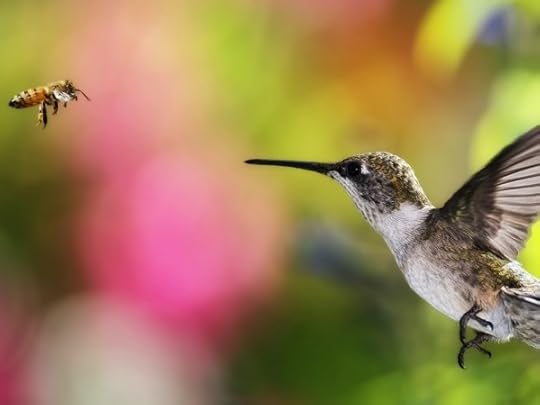
[image error]
We were sitting on our deck under the table umbrella on a beautiful summer morning. A bee flew up into the point of the umbrella, and there he stayed. He buzzed around the top looking for a way out. When he got tired he would rest on the fabric. Rested, he would once again try to get out through the top of the umbrella.
We knew that if he would fly down, instead of up, he would discover that he wasn’t trapped at all. But, he didn’t. He had trapped himself.
As we watched, a hummingbird flew under the umbrella straight at the bee. It hovered right by him, almost poking him with his beak, and then turned, showing him the way out from beneath the umbrella.
Did the bee follow? No. He continued to struggle trying to get out the top. Finally Del took the umbrella off the post, turned it upside down, and the bee flew up and away.
How often do we do this in our life?
We “fly” into a situation and then try to get out of it in a direction that will never work. If we would pause, or back up, or look around, we would see there is always a different way out.
Sometimes a friendly “hummingbird” will come up to us and attempt to show us a way to freedom. How often do we follow?
In the song, “Me and Bobby McGee,” there is the phrase, “Freedom’s just another word for nothing left to lose.” There are two ways to look at this sentence. One: Once everything is gone there is nothing left to lose. Or Two: When we realize that we have nothing that can be lost, we are free.
Jedi Master Yoda, from Star Wars, tells Anakin, “The fear of loss is the path to the dark side.” Afraid of losing something, we trade in our freedom for something with which we are familiar.
In the case of the bee, the top of the umbrella was familiar because he was used to “flying up” to get away. But, this familiarity and his unwillingness to let go of how he thought it should be, placed him in his own personal prison.
We all put ourselves in a personal prison. Just like the bee, it is the prison of our own thinking.
When we think we need something, or want something we are bound to it. Not by the thing itself, but by our thinking that we need it and don’t yet have it. The only thing that ever needs to be “fixed” is our perception.
It is our point of view that is always the trap, and at the same time it is always the open door.
When we choose, and then stay with, a point of view that we have to own things to have them, or that work provides income, or companionship provides love, and that the loss of anything means we no longer have it, we are trapped within our own personal prison.
There is a story about a boy in Sunday school. The teacher asked the children if they would be afraid if they found themselves alone in the middle of the ocean. They all answered, “Yes” except one small boy. He said, “No I wouldn’t be afraid.”
The Sunday school teacher asked him, “Why not?” He said, “Because God would be there with me.” The Sunday school teacher asked him, “How do you know for sure He would be there?”
The boy replied, “Because I was there.” This point of view is the key to freedom. The small boy knew that where he was, God was, and that meant there was nothing to fear, or to lose.
We all have had a friendly “hummingbird” or two that has shown us the way out of traps we have flown into. There are teachers, past and present, that have dedicated their lives to show us the way. It is so much easier to follow them than to wait until the world turns upside down so we can be set free.
Originally posted 8/12/2006
The post A Bee, A Hummingbird, and Freedom by Beca Lewis appeared first on The Shift.
A Bee, A Hummingbird, and Freedom - The Shift To Spiritual Perception

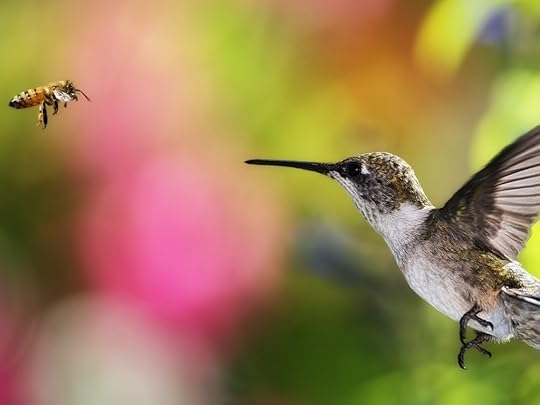
We were sitting on our deck under the table umbrella on a beautiful summer morning. A bee flew up into the point of the umbrella, and there he stayed. He buzzed around the top looking for a way out. When he got tired he would rest on the fabric. Rested, he would once again try to get out through the top of the umbrella.
We knew that if he would fly down, instead of up, he would discover that he wasn’t trapped at all. But, he didn’t. He had trapped himself.
As we watched, a hummingbird flew under the umbrella straight at the bee. It hovered right by him, almost poking him with his beak, and then turned, showing him the way out from beneath the umbrella.
Did the bee follow? No. He continued to struggle trying to get out the top. Finally Del took the umbrella off the post, turned it upside down, and the bee flew up and away.
How often do we do this in our life?
We “fly” into a situation and then try to get out of it in a direction that will never work. If we would pause, or back up, or look around, we would see there is always a different way out.
Sometimes a friendly “hummingbird” will come up to us and attempt to show us a way to freedom. How often do we follow?
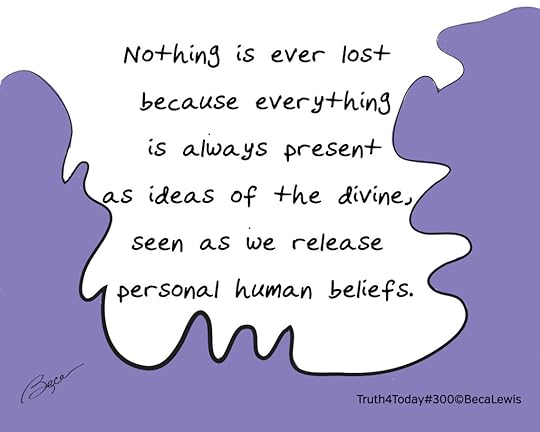
Click To Be On This List
In the song, “Me and Bobby McGee,” there is the phrase, “Freedom’s just another word for nothing left to lose.” There are two ways to look at this sentence. One: Once everything is gone there is nothing left to lose. Or Two: When we realize that we have nothing that can be lost, we are free.
Jedi Master Yoda, from Star Wars, tells Anakin, “The fear of loss is the path to the dark side.” Afraid of losing something, we trade in our freedom for something with which we are familiar.
In the case of the bee, the top of the umbrella was familiar because he was used to “flying up” to get away. But, this familiarity and his unwillingness to let go of how he thought it should be, placed him in his own personal prison.
We all put ourselves in a personal prison. Just like the bee, it is the prison of our own thinking.
When we think we need something, or want something we are bound to it. Not by the thing itself, but by our thinking that we need it and don’t yet have it. The only thing that ever needs to be “fixed” is our perception.
It is our point of view that is always the trap, and at the same time it is always the open door.
When we choose, and then stay with, a point of view that we have to own things to have them, or that work provides income, or companionship provides love, and that the loss of anything means we no longer have it, we are trapped within our own personal prison.
There is a story about a boy in Sunday school. The teacher asked the children if they would be afraid if they found themselves alone in the middle of the ocean. They all answered, “Yes” except one small boy. He said, “No I wouldn’t be afraid.”
The Sunday school teacher asked him, “Why not?” He said, “Because God would be there with me.” The Sunday school teacher asked him, “How do you know for sure He would be there?”
The boy replied, “Because I was there.” This point of view is the key to freedom. The small boy knew that where he was, God was, and that meant there was nothing to fear, or to lose.
We all have had a friendly “hummingbird” or two that has shown us the way out of traps we have flown into. There are teachers, past and present, that have dedicated their lives to show us the way. It is so much easier to follow them than to wait until the world turns upside down so we can be set free.
Originally posted 8/12/2006
The post A Bee, A Hummingbird, and Freedom by Beca Lewis appeared first on The Shift To Spiritual Perception.
A Bee, A Hummingbird, and Freedom
 Originally posted 8/12/2006
Originally posted 8/12/2006

We were sitting on our deck under the table umbrella on a beautiful summer morning. A bee flew up into the point of the umbrella, and there he stayed. He buzzed around the top looking for a way out. When he got tired he would rest on the fabric. Rested, he would once again try to get out through the top of the umbrella.
We knew that if he would fly down, instead of up, he would discover that he wasn’t trapped at all. But, he didn’t. He had trapped himself.
As we watched, a hummingbird flew under the umbrella straight at the bee. It hovered right by him, almost poking him with his beak, and then turned, showing him the way out from beneath the umbrella.
Did the bee follow? No. He continued to struggle trying to get out the top. Finally Del took the umbrella off the post, turned it upside down, and the bee flew up and away.
How often do we do this in our life?
We “fly” into a situation and then try to get out of it in a direction that will never work. If we would pause, or back up, or look around, we would see there is always a different way out.
Sometimes a friendly “hummingbird” will come up to us and attempt to show us a way to freedom. How often do we follow?

Click To Be On This List
In the song, “Me and Bobby McGee,” there is the phrase, “Freedom’s just another word for nothing left to lose.” There are two ways to look at this sentence. One: Once everything is gone there is nothing left to lose. Or Two: When we realize that we have nothing that can be lost, we are free.
Jedi Master Yoda, from Star Wars, tells Anakin, “The fear of loss is the path to the dark side.” Afraid of losing something, we trade in our freedom for something with which we are familiar.
In the case of the bee, the top of the umbrella was familiar because he was used to “flying up” to get away. But, this familiarity and his unwillingness to let go of how he thought it should be, placed him in his own personal prison.
We all put ourselves in a personal prison. Just like the bee, it is the prison of our own thinking.
When we think we need something, or want something we are bound to it. Not by the thing itself, but by our thinking that we need it and don’t yet have it. The only thing that ever needs to be “fixed” is our perception.
It is our point of view that is always the trap, and at the same time it is always the open door.
When we choose, and then stay with, a point of view that we have to own things to have them, or that work provides income, or companionship provides love, and that the loss of anything means we no longer have it, we are trapped within our own personal prison.
There is a story about a boy in Sunday school. The teacher asked the children if they would be afraid if they found themselves alone in the middle of the ocean. They all answered, “Yes” except one small boy. He said, “No I wouldn’t be afraid.”
The Sunday school teacher asked him, “Why not?” He said, “Because God would be there with me.” The Sunday school teacher asked him, “How do you know for sure He would be there?”
The boy replied, “Because I was there.” This point of view is the key to freedom. The small boy knew that where he was, God was, and that meant there was nothing to fear, or to lose.
We all have had a friendly “hummingbird” or two that has shown us the way out of traps we have flown into. There are teachers, past and present, that have dedicated their lives to show us the way. It is so much easier to follow them than to wait until the world turns upside down so we can be set free.
Originally posted 8/12/2006
The post A Bee, A Hummingbird, and Freedom appeared first on The Shift.
May 17, 2015
Sing Knowing That You Have Wings - The Shift
 Originally posted 4/7/2009
Originally posted 4/7/2009[image error]For as long as I can remember, one of my favorite poems has been Victor Hugo’s,
“Be like the bird that, passing on her flight awhile on boughs too slight, feels them give way beneath her, and yet sings, knowing that she hath wings.“
Isn’t this poem beautiful? It sings about the principle and perception that no matter what appears to be happening, when we know who we are, then we can sing knowing that we have wings, and can easily fly up and away to safety.
While walking in the woods I watched our hawk’s nest high in the tree swaying in the wind, and felt the meaning of this poem even more deeply. Having felt for myself the bite of fear while sitting in a tree while it swayed, I thought of what it would feel like to be that high and ride through the blasts of wind that whip the tree limbs around so freely.
I imagined that if it were me, I would worry that the limb would break, and then what would I do? And then I laughed out loud, startling a few wood creatures I am sure, with the realization of what the “knowing that she hath wings” means to a bird. If the limb would break they would simply fly away, singing as they always do with the joy of the freedom of flight.
Notice that my thought about falling began with a “what if question” that made me feel afraid. Of course I would be afraid I would fall if I didn’t find peace in the knowledge that there is always safety, and always a solution, and this knowing will act as wings, always flying me to freedom and safety.
Victor Hugo’s life’s work was profoundly influenced by his awareness of the social injustice, inequality, suffering, and uprising that was the underlying theme of France in the 1800’s, the place and time in which he lived. His writings, like “Les Miserables,” were directed at pointing out, and bringing to light what was wrong within “the system,” so it could be corrected.
Yet, he wrote a simple and elegant poem on how to escape, without harm, the mess that the worldview dualist system makes. He wrote about how a bird, faced with a weak and falling branch, “Sings, knowing that she hath wings.”
Not only does she fly away as the weak branch breaks, she sings. She sings before the need to fly. She sings in the morning in celebration of a new day. She sings in the day, not because she must, but because she can.
A Chinese proverb says, “A bird does not sing because it has an answer. It sings because it has a song.”
Are you singing your song?
Until we are all aware of and acting within the awareness of the oneness of what appears as mankind, aware that we are within the circle of One, and not without it, aware and acting from the Principle of the Infinite Intelligence known as Love, social injustice, inequality, and suffering will appear within the times we live within.
Yet, we do not have to be part of the suffering, we can “Sing, knowing that we have wings.” We can sing as the bird does, because we have a song.
No matter what we call the voice of the “system,” worldview, predator, or monkey mind, this voice is belligerent, loud, but subtle, demanding that we listen to it. It brings with it all the emotions that begin and end with fear, with its tag along friends called doubt, anger, discouragement, frustration, sadness, despair, and the rest of these life-hope-stealing companions of the “what if” voice of the lie called, fear.
Since we do live in a thought universe we must be able to recognize who is asking the question, “what if,” and who is doing the thinking. It’s hard to sing when we are within the grips of the “what if” voice of fear, but there is another “what if” voice, and it sings the song of the Infinite Principle of Love.
The “still small voice within” brings gifts of love, with its corresponding comforting feelings of hope, encouragement, possibility, joy and the rest of its friends that encourage us to “sing, knowing that we have wings.”
Sometimes this voice also says “what If,” but this “what if” is not loaded with fear, it is loaded with hope and possibilities. It sings to us that there is always an open door; there is always a solution, that we are never separate from the gifts of Love, that there is noone who has more than others within the Infinite provision and equality of the Divine.
To hear this voice we must pause and listen to the stillness within the peace of Love. To hear this voice we have to stop agreeing with the “what if” voice of fear. It may still be making noise, but we are not listening, because we have the thought wings of awareness of the omnipresence of Love.
What isn’t love is loud and insistent that we pay attention to it, like a petulant child, or a bully or even a terrorist. That doesn’t mean we bow down to it and give into its demand to be afraid. Instead we pay attention to the peace, beauty and love that is all around us and when we do this, what to do about the bully of fear becomes evident.
If we attempt to fight fear it has us in its grip. Instead, we sing knowing that we have wings, and rise above it watching it dissolve itself as it battles with itself, which is all that it knows how to do.
“Sing, knowing that you have wings,” sing with celebration, sing with gratitude. Share your song, sing of joy, sing of good, sing of the evident abundance within your life. Sing, because singing of these things reveals even more goodness, sing because it dissolves the blinders imposed by fear, and reveals the consistent care always present for you.
Sing of the abundance of your neighbors and friends, show it to them, and share it with them. We cannot be rich without all being aware of their richness.
Afraid that your clients can’t afford you, or your company can’t keep you on? Sing, knowing they have wings too, sing knowing that abundance does not come from people, places and things, but appears because you are present, the representation and idea of abundance itself
Keep singing when the wind blows, or the limb you are on begins to break. Sing, that there is nothing to fear, you are One within the One of the I Am. Gather your thoughts to this place and keep them there, and let the illusion that threatens dissolve itself into the nothingness from which it came, never touching you, or your loved ones.
Sing Knowing That You Have Wings!
Originally posted 4/7/2009
The post Sing Knowing That You Have Wings by Beca Lewis appeared first on The Shift.



